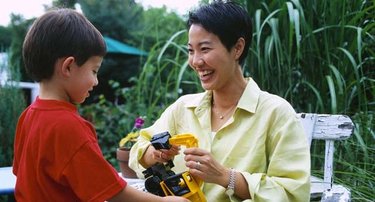 It’s true! Parenting is a 24/7/365 job, with no time off, no vacation, no breaks. Remember when that little new born was laying on your chest right after their birth? Despite the pains of childbirth, and don’t let anyone try to convince you that it’s just “pressure,” new parents feel an understandable mix of joy, terror, excitement, pressure, relief, and dread. Jody was sweating, her hair matted, and her heart racing after just having given birth to Hannah. She reached out to the nurse who held tiny Hannah and extended her to place in Jody’s awaiting arms. New daddy, Tommy, leaned in smiling, witnessing the blessing of their new family. Jody looked back and forth from Hannah to Tommy. Terrifying questions flooded her mind. Oh… my… gosh, what have we gotten ourselves into? Can I do this? Am I ready? This little bundle of human being is totally helpless and completely my responsibility. It’s also true that raising children takes a village. We lucky parents have the available resources of our children’s grandparents, extended family, neighbors, co-ops, play groups, day cares, church groups, and many other, personalized resources. Being “alone” with your newborn is avoidable, but you have to reach out. You have to ask. When our children were home, Maggie and I developed the concept of what we called tag team parenting. When one of us was done, exhausted, at our wit’s end, we could reach out and tag the other, “You’re it.” Tag other people in your lives when there’s too much to do. Other things to do when there’s too much to do include delegate, organize, make lists, plan ahead, streamline, and make time to chill out. Many new parents race around doing everything that was on hold while the baby was awake. Do those things with your new baby and she will get used to household routines and not scream for your attention endlessly. Rule of thumb for new moms. When Hannah is sleeping, Jody is sleeping, or at least resting, too. If you don’t give yourself time for your needs and feelings, called self-care, your time for your baby, called other care, will be less meaningful for both of you. When there’s too much to do, go for a balance between self-care and other-care.
0 Comments
 You are expecting, or just had, a newborn baby. From my own experience, I can tell you that I was equal parts thrilled and terrified, excited and overwhelmed. Even with extended family around, there’s a feeling that the buck stops with me and that I’d better get this right. Do we always get it right? No. Do we understand all of our child’s baby talk? We try, but, no. What’s a new parent to do? Despite the best intentions of those who’ve been there, done that, first born parenting is by definition a task of learning on the job. Our first borns are always our experimental child, because we are just trying out what we think is the right way to parent, without really knowing what the heck we are doing. With our first born, I was determined to be the best dad ever. That meant rocking her each night until she was fast asleep in my arms. Then I would transfer her to her crib. Within 30 seconds of putting her down, she would let out a scream that would curl the paint on the walls. After many nights of rocking her for over 3 hours to no avail, my wise and lovely wife challenged me. She suggested I take the stopwatch out of my testing kit, put our daughter down after 15 minutes of rocking her, and time how long it would take for her to fall asleep. I was aghast! How could I let her cry in her bed for hours on end until she fell asleep? Well, the time is embedded in my brain to this day. 6’36” and she was fast asleep for the night. I learned my lesson. What I thought was her cry of protest was a cry for attention. The more attention I gave her, the longer she stayed awake. Take heart, new parents. You will soon learn the difference between your child’s “I’m hungry,” “I’m poopy,” I want attention,” “I’m mad,” and the most used, “I’m just messin’ with you” cries. If both parents are available, take turns both to help your child respond to each of you and also to spell each other on the job. And especially, if at all possible, when newborn is down for a nap, so should you be as well. Ask for help. Don’t try to be all things to all people. Learn to translate your child’s baby talk to tailor your response for both your needs and those of your child.  As we all know, kids come in all shapes and sizes. You know what else? So do parents. Some parents choose to be the power-oriented, in control kind of guy. These folks parent by fear and have only a fear-based relationship with their children. “My way or the highway” is their theme. Others go to the opposite extreme and become a doormat to their children. “Yes, dear. Whatever you want” They fear that confronting their child or setting healthy boundaries will stunt their emotional growth and lower their self-esteem. Such well-intentioned parents will put their child in T-Ball, where runs scored are not kept because “we want them all to be winners.” Fortunately, Jesus gave us another option, providing a third role model for effective parenting. Before the Last Supper, He removed his outer robe, got a bowl and washcloth, and washed the feet of his disciples. This lowly but loving act of service is our example of being a servant parent. What??? Let’s be clear. This was not submission. It was servanthood. Jesus followed with His teachings about the first being last and the greatest being the least. Being a servant parent involves understanding your child’s needs and feelings, and being supportive while helping tend to them. Fifteen year old Chip stomped into his dad’s den early one morning, where dad was paying bills. “Dad, this shirt’s dirty and I want to wear it today.” Dad stopped his work, and, while getting up, responded, “Okay, Son, let me wash it for you right away.” While thinking he was being helpful, dad was being a doormat, with no teachable moment in sight. Eight year old Tommy is doing his homework in his room. His mom checks on him and offers, “I’ve got some time, Son. If you put your vocabulary words on flash cards, I’ll quiz you when you’re finished.” Classic servant parenting. Being helpful and available, sharing the load. And ripe for a teachable moment. Which are you? Power dude, doormat or servant parent?  Some folks believe that the Christmas season should be year round. Is that because of all of the giving, or all of the getting? Servanthood parenting is not about the getting. It’s about the giving. We should be servants to our children? What??? It’s not about doing everything for your children. "Dad, this shirt's dirty and I want to wear it today." "Okay, son, let me wash it right away." That sets the stage for children feeling entitled and being demanding. It is about Godly parenting, "I've got some time, son. If you put your vocabulary words on flash cards, I'll quiz you when you're finished."You know your child’s needs and feelings, you anticipate, you guide, you find teachable moments. God sent parents to children to be His emissaries. Jesus is our parenting role model. His parenting His flock is the ideal role model for our parenting our children. Through His ministry and example, he gained an earned authority to convey wisdom to his followers. He preached servanthood in Matthew 19:30, where he explained that “the last shall be first and the first shall be last.” When my kids were vying for seats on car rides, my rule was that the one who called dibs got to pick last. Since neither one wanted to go first, I could use the seat placement as reward. “Do it because I said so.” Will get you fearful compliance at the expense of emotional intimacy and meaningful relationship. As servant parents, we develop earned authority, where our children follow our direction because they want to, not only because they have to. During Christmas and other seasons of our lives, it is truly about the giving. |
Archives
January 2024
Categories
All
|

 RSS Feed
RSS Feed
